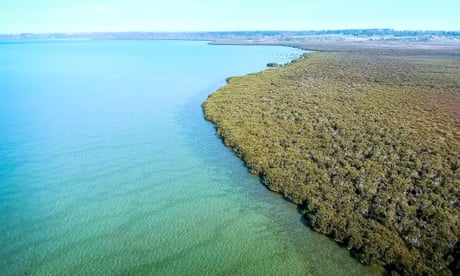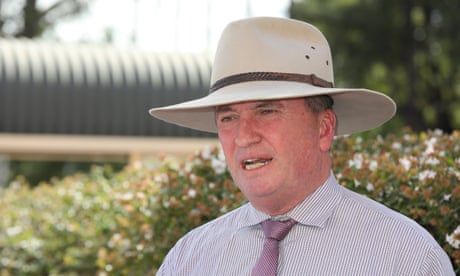Australia: Angus Taylor says he did not set up Cayman Islands structure on $80m water buyback
By Annie Davies From The Guardian UK

Energy minister was a director of Eastern Australia Agriculture but says he only advised on the agricultural side
The energy minister, Angus Taylor, has denied he played a role in structuring the company which received an $80m government buyback of its water rights through the tax haven of the Cayman Islands.
Taylor, who was a director of Eastern Australia Agriculture between 2008 and 2009 and who described himself as a co-founder of the company, told ABC Radio National on Thursday morning he was involved only in advising on the agricultural side of the investment.
He said he severed all involvement in the company prior to being elected to parliament.
EAA was paid $80m for its overland flow water rights without tender in 2017 when Barnaby Joyce was agriculture minister.

“I was a consultant and I was paid consultant’s fees,” he said. “That’s what consultants do. I never had an interest in the company or any related company nor did any of my family members,” he said.
“I concluded any relationship with the company before I entered parliament. I didn’t receive any benefit from the buybacks; indeed I wasn’t aware of them until some time after they happened,” he said.
Further questions have emerged because EAA’s parent is the company Eastern Australia Irrigation, which is based in the Caymans, a tax haven that reveals few details about the businesses based there.Advertisement
Asked why he set up a company domiciled in the Caymans, Taylor said he had not been involved in that part of the deal but defended it as a common structure.
“This structure and domicile is common practice. It’s used by many Australian super funds: CBus, Rest, Australian Super and the Future Fund,” he said.
“The reason for this structure is very simple: it’s to ensure that taxpayers pay tax, as they must, where they live.,” he said.
“It’s widely used by super funds and many, many of your listeners will be invested in these structures,” he said.
Caymans is a tax haven so investors pay no tax in that jurisdiction. If the income on the investment is paid to an Australian taxpayer, it should be declared and taxed in Australia.
However, if the investor is foreign domiciled, as many of the investors in EAI were, then there is no Australian tax payable. Presumably the investors, which included a Hong Kong fund and a UK fund, were liable for tax in their countries, though many of the investors themselves were structured using tax havens.
Companies using tax havens also often use a variety of methods to lower the tax bills of the Australian company which is earning income from the activity, whether it is mining, agriculture or selling running shoes.

Commonly used measures include inter-company loans with high interest rates that reduce pre-tax earnings, marketing fees payable to the offshore entity by the Australian company and other forms of transfer pricing.
The Australian Taxation Office has clamped down on these as part of its anti-avoidance campaigns in recent years.
The 2017-18 EAA accounts show the Australian company had a $30m loan from the parent company, EAI, that was repaid in August 2017 after the water buyback earned the company $52m profit, however there is nothing to suggest it engaged in tax minimisation practices.
Its tax affairs were complex because the company had deferred tax losses due to losses made prior to the windfall of the water buyback.
At this critical time…
… we can’t turn away from climate change. For The Guardian, reporting on the environment is a priority. We give climate, nature and pollution stories the prominence they deserve, stories which often go unreported by others in the mainstream media. At this critical time for humanity and our planet, we are determined to inform readers about threats, consequences and solutions based on scientific facts, not political prejudice or business interests. But we need your support to grow our coverage, to travel to the remote frontlines of change and to cover vital conferences that affect us all.
More people are reading and supporting our independent, investigative reporting than ever before. And unlike many news organisations, we have chosen an approach that allows us to keep our journalism accessible to all, regardless of where they live or what they can afford.
The Guardian is editorially independent, meaning we set our own agenda. Our journalism is free from commercial bias and not influenced by billionaire owners, politicians or shareholders. No one edits our editor. No one steers our opinion. This is important as it enables us to give a voice to those less heard, challenge the powerful and hold them to account. It’s what makes us different to so many others in the media, at a time when factual, honest reporting is critical.
Every contribution we receive from readers like you, big or small, goes directly into funding our journalism. This support enables us to keep working as we do – but we must maintain and build on it for every year to come. Support The Guardian from as little as $1 – and it only takes a minute. Thank you.
For more on this story and to donate go to: https://www.theguardian.com/australia-news/2019/may/02/angus-taylor-says-he-did-not-set-up-caymans-structure-on-80m-water-buyback





